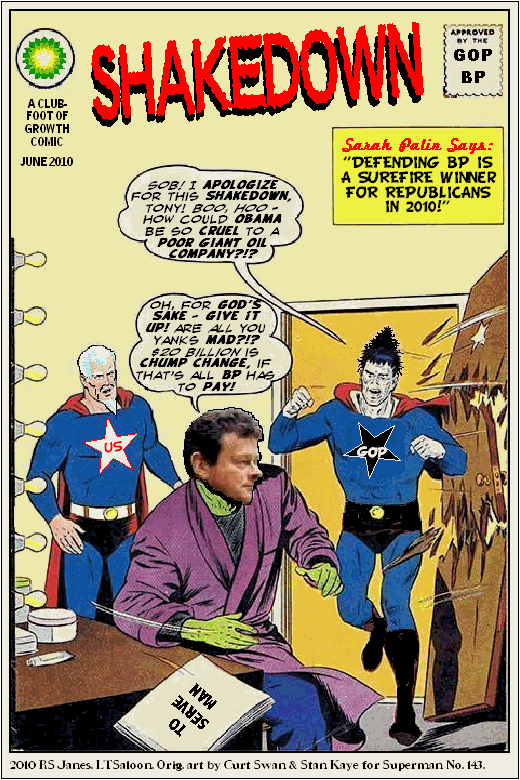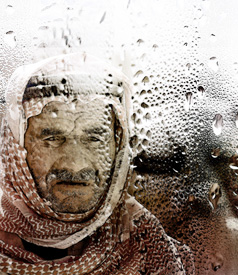by Stephen Kinzer
Only one industry in the world can make Wall Street's earnings look like chump change: Big Oil. This is, after all, a business where a "slump" year for international oil giant ExxonMobil means annual profits of only $19 billion. A few years earlier, on the back of skyrocketing oil prices, the same company had netted $45 billion, the single largest annual profit in history, a sum that exceeded the gross domestic products of more than half the world's nations. And as Exxon was drilling its way into the record books in the U.S. in 2008, Royal Dutch Shell was doing the same in Britain, hauling in $27.5 billion, or a mind-bending $75 million in profits daily. To keep the cash coming in, the five biggest oil and gas corporations have spent nearly $34 billion in the past three years on exploration. To keep American lawmakers off their backs or in their pockets, they've spent $195 million on lobbying over that same period.
Here's what they haven't spent their largesse on: oil-spill response. BP, whose American operations may never recover from its Deepwater Horizon catastrophe, told Congress it spent about $9.6 million in each of the past three years on research into safer drilling technologies. ConocoPhillips spent an even more meager $1.3 million -- and that was over three years. Congressman Ed Markey (D-Mass.) has ripped oil companies for their negligence, and called their preparations for future catastrophes "paltry." Given the funding, it's hardly a surprise that oil companies like BP are now stuck with antiquated and ineffective tools when a spill occurs, no less a spill a mile under the Gulf of Mexico's waters. As the Associated Press reported recently, the main technologies being used in the Gulf -- oil dispersants, offshore booms, and skimmers -- are the very same ones employed to clean up the Exxon Valdez spill two decades ago.
Now that it's helped create one of the great environmental catastrophes in history, BP has typically pledged to right its wrongs, including by giving $500 million to fund "independent research" into the impact of the Gulf spill on the marine and shoreline environment. Of course, you don't need millions in funding to know that the effect of BP's spill will reverberate throughout the Gulf coast region and along Florida's white sand beaches for decades, possibly generations. As Stephen Kinzer, the acclaimed author of the newly published Reset: Iran, Turkey, and America's Future, writes in his debut TomDispatch post, the Deepwater spill is hardly the first time BP has wreaked havoc on a nation and its people. Andy
BP in the Gulf -- The Persian Gulf
How an Oil Company Helped Destroy Democracy in Iran
By Stephen Kinzer
To frustrated Americans who have begun boycotting BP: Welcome to the club. It's great not to be the only member any more!
Does boycotting BP really make sense? Perhaps not. After all, many BP filling stations are actually owned by local people, not the corporation itself. Besides, when you're filling up at a Shell or ExxonMobil station, it's hard to feel much sense of moral triumph. Nonetheless, I reserve my right to drive by BP stations. I started doing it long before this year's oil spill in the Gulf of Mexico.
My decision not to give this company my business came after I learned about its role in another kind of "spill" entirely -- the destruction of Iran's democracy more than half a century ago.
The history of the company we now call BP has, over the last 100 years, traced the arc of transnational capitalism. Its roots lie in the early years of the twentieth century when a wealthy bon vivant named William Knox D'Arcy decided, with encouragement from the British government, to begin looking for oil in Iran. He struck a concession agreement with the dissolute Iranian monarchy, using the proven expedient of bribing the three Iranians negotiating with him.
 Under this contract, which he designed, D'Arcy was to own whatever oil he found in Iran and pay the government just 16% of any profits he made -- never allowing any Iranian to review his accounting. After his first strike in 1908, he became sole owner of the entire ocean of oil that lies beneath Iran's soil. No one else was allowed to drill for, refine, extract, or sell "Iranian" oil.
Under this contract, which he designed, D'Arcy was to own whatever oil he found in Iran and pay the government just 16% of any profits he made -- never allowing any Iranian to review his accounting. After his first strike in 1908, he became sole owner of the entire ocean of oil that lies beneath Iran's soil. No one else was allowed to drill for, refine, extract, or sell "Iranian" oil.
"Fortune brought us a prize from fairyland beyond our wildest dreams," Winston Churchill, who became First Lord of the Admiralty in 1911, wrote later. "Mastery itself was the prize of the venture."
Soon afterward, the British government bought the D'Arcy concession, which it named the Anglo-Persian Oil Company. It then built the world's biggest refinery at the port of Abadan on the Persian Gulf. From the 1920s into the 1940s, Britain's standard of living was supported by oil from Iran. British cars, trucks, and buses ran on cheap Iranian oil. Factories throughout Britain were fueled by oil from Iran. The Royal Navy, which projected British power all over the world, powered its ships with Iranian oil.
After World War II, the winds of nationalism and anti-colonialism blew through the developing world. In Iran, nationalism meant one thing: we've got to take back our oil. Driven by this passion, Parliament voted on April 28, 1951, to choose its most passionate champion of oil nationalization, Mohammad Mossadegh, as prime minister. Days later, it unanimously approved his bill nationalizing the oil company. Mossadegh promised that, henceforth, oil profits would be used to develop Iran, not enrich Britain.
This oil company was the most lucrative British enterprise anywhere on the planet.
http://www.tomdispatch.com/archive/175267/


 Afghanistan has been getting all the ink lately, and for good reason. General Stanley McChrystal's act of self-immolation by way of Rolling Stone magazine kicked off a genuine no-bones-about-it constitutional crisis over civilian control of the military, until President Obama sacked him at pretty close to the speed of light. The number of troop deaths has reached 100, making June the deadliest month for the coalition since this war began eight years ago. Civilians continue to die all over the place, the poppies continue to flourish, and there's talk about talks with the Taliban, but nobody really wants to talk about that. The so-called "mainstream" media was kind enough to wait for a Democrat to be in the White House before publicly coming to the conclusion that the war looks unwinnable. Somewhere, George W. Bush is smirking over that one, but that's just par for the course.
Afghanistan has been getting all the ink lately, and for good reason. General Stanley McChrystal's act of self-immolation by way of Rolling Stone magazine kicked off a genuine no-bones-about-it constitutional crisis over civilian control of the military, until President Obama sacked him at pretty close to the speed of light. The number of troop deaths has reached 100, making June the deadliest month for the coalition since this war began eight years ago. Civilians continue to die all over the place, the poppies continue to flourish, and there's talk about talks with the Taliban, but nobody really wants to talk about that. The so-called "mainstream" media was kind enough to wait for a Democrat to be in the White House before publicly coming to the conclusion that the war looks unwinnable. Somewhere, George W. Bush is smirking over that one, but that's just par for the course.



![[Image]](http://harpers.org/media/image/blogs/misc/eisenhower_d-day.jpg)






 A senior US lawmaker on Monday angrily blocked billions of dollars in aid to Afghanistan, vowing not to give "one more dime" until Afghan President Hamid Karzai acts against corruption.
A senior US lawmaker on Monday angrily blocked billions of dollars in aid to Afghanistan, vowing not to give "one more dime" until Afghan President Hamid Karzai acts against corruption.
 Welcome to the surveillance society.
Welcome to the surveillance society.






